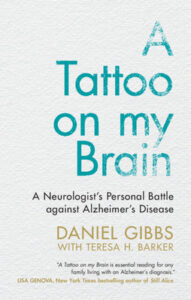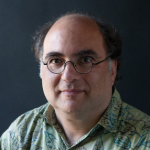by Rona | Jun 22, 2021 | KPFA, Podcasts, Radio Shows
Listen now on About Health on KPFA radio— 94.1FM (6/28/21)
Alzheimer’s, which is a neurological disorder, affects 6.2 million Americans. “Worldwide, around 50 million people have dementia, and there are nearly 10 million new cases every year. Alzheimer’s disease is the most common form of dementia and may contribute to 60–70% of cases.” —World Health Organization.
There is no cure for Alzheimer’s, but there is extensive clinical research being done. The pathological changes in a person’s brain start ten to twenty years before there is cognitive impairment…and so it’s vital that life style changes begin before typical symptoms show up. My guest, Dr. Daniel Gibbs, has been devoting his time to raising awareness about early-stage Alzheimer’s, and what people can do about it, in order to live a meaningful life for a longer time.
 Guest
Guest

Dr. Daniel Gibbs is a retired neurologist in Portland Oregon, with early-stage Alzheimer’s disease. Having spent twenty-five years caring for patients, many with dementia themselves, he is now an active advocate for the early recognition and management of Alzheimer’s. He is the author, along with Teresa H. Barker, of the recently released book “A Tattoo on my Brain. A Neurologist’s Personal Battle against Alzheimer’s Disease”
by Rona | Feb 10, 2021 | KPFA, Podcasts, Radio Shows
Listen now to the 2/15/21 show on KPFA.org (94.1FM)
50 million people are living with Alzheimer’s and other dementias worldwide, and there are nearly 10 million new cases every year. Here in the U.S. African Americans are twice as likely to develop Alzheimer’s and other dementias, but only half as likely to get a proper diagnosis, treatment or access to support resources.Join us to talk about the diagnosis and care of people with dementia and how culture, race, and health disparities are important parts of the discussion.
Guest:

Karla Fields is a Community Outreach Specialist at the Alzheimer’s Association. Her primary focus is outreach to the African American community. She is a former educator and has over 30 years experience in education, public relations, fundraising and civic engagement. In her free time Karla enjoys spending time with her husband and three children. https://www.alz.org/norcal
by Rona | Jun 23, 2017 | Announcements, Appearances, KPFA, Podcasts, Radio Shows

Listen now to todays show on About Health (June 26th) on @KPFA for a conversation about Dementia and the Brain.
Dementia is an overall term that describes a wide range of symptoms associated with a decline in memory or other thinking skills, severe enough to reduce a person’s ability to perform everyday activities. Alzheimer’s disease accounts for 60 to 80 percent of cases. Vascular dementia, which occurs after a stroke, is the second most common dementia type. But there are many other conditions that can cause symptoms of dementia.
 Josh Kornbluth, is currently engaged in a year-long residency as a scholar at the Global Brain Health Institute. He is spending his time with people who have dementia and their caregivers, as well as researchers, nurses, social workers, and others.
Josh Kornbluth, is currently engaged in a year-long residency as a scholar at the Global Brain Health Institute. He is spending his time with people who have dementia and their caregivers, as well as researchers, nurses, social workers, and others.
Described as a cross between Woody Allen and Spalding Gray, Josh Kornbluth has been performing autobiographical one-man shows since 1987. The San Francisco Chronicle declared, “Kornbluth takes a world we ignore, or barely observe, and brings it into brilliant comic relief.” He launched his career as a solo artist with Josh Kornbluth’s Daily World, in which he described his childhood as the son of communists in 1960s New York. He is currently working on a solo show based on his experiences as an artist-in-residence and volunteer at the Zen Hospice Project in San Francisco. For two years he hosted an interview program, “The Josh Kornbluth Show,” on KQED TV. His latest feature film, Love & Taxes, is his second in collaboration with his brother Jacob; in a review, Variety called him “a nerd for our time.” His first feature film, Haiku Tunnel, is currently on HBO. Check out his web site at http://joshkornbluth.com/
 Dr. Jennifer Yokoyama is an Assistant Professor at the UCSF Memory and Aging Center, where she is building an independent research program in neurogenetics of aging. More specifically, she is interested in how genomic variation influences brain anatomy, physiology, and cognitive behaviors in healthy older adults, and how genomic variation relates to vulnerability, as well as resilience, against neurodegenerative processes of aging. Dr. Yokoyama obtained her doctorate degree in Pharmaceutical Sciences and Pharmacogenomics in 2010 at UCSF and completed her postdoctoral training in neuroimaging at the UCSF Memory and Aging Center.
Dr. Jennifer Yokoyama is an Assistant Professor at the UCSF Memory and Aging Center, where she is building an independent research program in neurogenetics of aging. More specifically, she is interested in how genomic variation influences brain anatomy, physiology, and cognitive behaviors in healthy older adults, and how genomic variation relates to vulnerability, as well as resilience, against neurodegenerative processes of aging. Dr. Yokoyama obtained her doctorate degree in Pharmaceutical Sciences and Pharmacogenomics in 2010 at UCSF and completed her postdoctoral training in neuroimaging at the UCSF Memory and Aging Center.
 Guest
Guest




 Dr. Jennifer Yokoyama is an Assistant Professor at the UCSF
Dr. Jennifer Yokoyama is an Assistant Professor at the UCSF